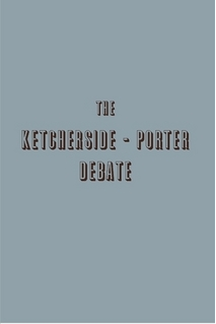| The Ketcherside - Porter Debate Reviewed by Nathan Battey The Ketcherside-Porter debate was a monumental debate over the topic of Institutionalism. The debate took place in 1937 and was conducted over a four night period. Rue Porter, was in his late forties at the time, and was considered one of the ablest debaters among those in favor of orphan’s homes and Bible colleges, having had twenty-five debates prior to his encounter with Ketcherside. Carl Ketcherside, on the other hand, was a young man of twenty-eight years old and had not had any formal debates prior to this occasion. In the end, experience did not serve Rue Porter well, nor did youth and inexperience hamper Ketcherside. |
The erection and maintenance of orphans homes, such as Tipton Orphans Home, Southern Christian Home, and others of like character, for the purpose of housing and otherwise caring for orphan children, is authorized by the New Testament scriptures.
Rue Porter affirms.
W. Carl Ketcherside denies.
The erection and maintenance of schools or colleges, such as Abilene Christian College, David Lipscomb College, and others of like character, for purpose of teaching the Bible and other branches .of learning in connection, is contrary to the New Testament, and should be opposed as an innovation in the church.
W. Carl Ketcherside affirms.
Rue Porter denies.
Rue Porter argued that the Bible instructs Christians to take care of widows and orphans (James 1:27) yet does not instruct how such work is to be done. Thus, Porter argued that Bible silence permits and that the Christian and the church are free to use whatever means necessary to accomplish their obligation of caring for the widows and orphans.
Carl Ketcherside argued that God was not silent about the “how” of taking care of the widows and orphans. Ketcherside demonstrated that by using the same methods of interpretation that are used in addressing the Instrumental Music issue (command, example, and necessary inference), one could discover a pattern that did not include or allow the erection of orphanages and retirement homes. Ketcherside argued that it was wrong for the church to erect and financially support such organizations on the grounds that they were unauthorized and were opposed to the Biblical pattern of caring for the orphans and widows.
The following is a quote of an illustration Ketcherside made to defend the Christian’s personal responsibility to look after orphans as opposed to doing such through a medium of a church sponsored orphanage:
"My respondent said much in conclusion about the spirit of Christ and told about all the good he had done. I want to tell you the difference between Brother Porter's position and mine as it relates to caring for orphan children. Let us imagine that there is an orphan in the community near Neosho, and somebody says, "Brother Porter, we have located a little homeless orphan, destitute and alone. What shall we do with it." My friend says, "We have an Orphans Home at Tipton, ship the child down there, and when the truck comes around once a month, we'll send them a peck of potatoes, fifteen cents worth of sugar, and a box of salt, because that's the way we obey the command to visit the fatherless and widows. If we have anything we can't use we'll send it down there, perhaps once every three months."
But the scene changes. Someone comes and says to my wife and I, "Here is a poor little homeless waif, with no one to care whether she lives or dies." What should we do? We take that orphan child into our home, and when the eventide falls, and all the world is still, my faithful companion holds that babe close to her breast and soothes it with those words she speaks. And the little child says, "Where is my daddy and mother, I want my daddy." My wife whispers to her, "This man is going to be your daddy and I am going to be your mother, and you shall have this golden-haired girl of ours for your sister, and we are going to keep you and take care of you, watch over you, and see that you are protected from the chilly blast of winter, and the heat of the summer. We will try to rear you in the nurture and admonition of the Lord, and you may call me "mother" and him "daddy".' And when that poor child falls asleep at night, with the tears dried from her eyes, my wife tucks her into bed beside our own dear children, and her sleep is happy and contented. I am asking you my friends, if you can contrast the difference between this gentleman here, and myself? I am asking you, which one has the most of the spirit of Jesus Christ about it?"
Rue Porter attempted to argue that Bible colleges such as Abilene Christian and Freed-Hardeman were not funded by congregational treasuries, but was unable to do so. He also tried to argue that the primary purpose of the Bible colleges was not to teach the Bible but rather to teach normal academic courses and merely provide a safe environment for Christian youth. Porter was not able to substantiate either of his positions and in the end tried to argue that Ketcherside was bringing division into the Church because of his failure to accept both the institutions of orphanages and Bible colleges.
Though Rue Porter was a capable debater, it is the opinion of this writer that he did not have the truth on this occasion and thus was not able to substantiate his beliefs through the Word of God. The result was a crushing defeat and produced one of the greatest sources of material to date in opposition of institutionalism (orphanages and Bible colleges in particular).
Unfortunately, the Ketcherside-Porter debate has been out of print for years and has consequentially fallen out of the memory of the general public. The reason this debate disappeared is two-fold: First, Ketcherside changed his position later in life and no longer agreed with the material presented in this debate. Since he was the publisher, be decided not to republish the debate and allowed it to fade into history. Like all of his publications, Ketcherside did not copyright this material and thus we are now able to reprint it and make it available once more.
The second reason this debate has been forgotten is because most Non-Institutional brethren do not agree with Ketcherside’s opposition to Bible colleges as presented in this debate. Most Non-Institutional brethren oppose Bible colleges based on their funding structure rather than the fact that they are institutions erected to do the work of the Church while being separate and apart from the Church. Thus, most Non-Institutional brethren support the Florida Bible College since it is privately funded while opposing other universities because they are supported by congregational treasuries.
It is my hope and prayer that many will rediscover this work and reconsider the issues found herein in light of God’s holy word. It is vitally important that those claiming to be the Lord’s people will once again “Speak where the Bible speaks, and be silent where the Bible is silent.” May the Lord’s people not only stand for truth, but also understand why they are standing and what they are opposing.
A side note regarding the history of the debate over Bible colleges among churches of Christ:
Carl Ketcherside, E. M. Zerr, and Daniel A. Sommer were three outspoken preachers of that day who fought hard for the all-sufficiency of the Church in their opposition to Bible colleges. Some of their writing have survived and we are attempting to bring them back into print. For other works on this issues, check out our reprints of Carl Ketcherside’s book Concerning Christian Colleges and Daniel A. Sommer’s work The Church of Christ.


 RSS Feed
RSS Feed
